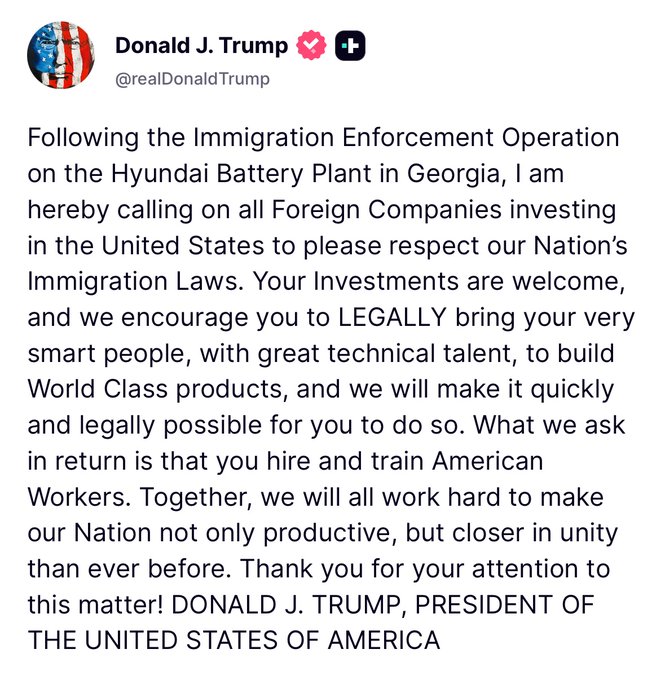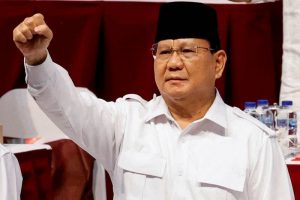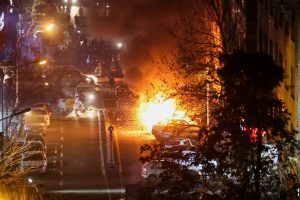South Korea is sending a top cabinet minister to Washington to try to ease the bilateral shock and anger spurred by the arrest of hundreds of its citizens at a battery plant in the United States.
Foreign Minister Cho Hyun will fly to Washington on Monday after a huge immigration raid staged at a time when Seoul has vowed to make investments in the US totalling $350 billion as part of a tariff deal.
His government has said the release of a video showing the arrest of 475 workers, including over 300 South Koreans, some of whom were shackled and wearing vests with company names, was regrettable, especially as the incident followed so closely after a summit between the two nations’ leaders.
ALSO SEE: US Lowers Japan Auto Tariffs But Some Carmakers Will Still Hurt
Seoul said on Sunday that negotiations to arrange the release of about 300 Korean workers arrested at a Georgia battery plant being built by Hyundai Motor and LG Energy Solution had been done and a plan is in process to fly them home this week.
The detention of the workers by the Department of Homeland Security agents sent shockwaves through South Korea, a major US ally that has been rushing to finalise a US trade deal agreed in late July.
$101bn of Korean investment in US at risk
The Korea Economic Daily said there were “growing concerns in the business community that major Korean investment projects in the US could be affected, including the joint Make American Shipbuilding Great Again project, plus Hyundai Steel’s construction of a US steel mill, plus the expansion of factories by power equipment manufacturers HD Hyundai Electric, Hyosung Heavy Industries and LS Electric.
It quoted a company executive in Seoul as saying: “Korean workers are treated like criminals for building factories that Washington itself lobbied for. If this continues, investment in the US could be reconsidered.”
The paper said the projects required the deployment of hundreds of employees from headquarters and partner companies and that the detained employees entered the US under the Electronic System for Travel Authorization (ESTA) or short-term B1 business visas, because H-1B and L-1 work visas were harder to obtain and in short supply.
That meant Korean firms rotated engineers through 90-day ESTA entries or short-term B-1 visas to meet tight construction schedules.
Industry officials in Seoul said investment timetables worth more than 140 trillion won – $101 billion – across multiple US states would face serious delays and cost overruns if visa arrangements for skilled Korean staff weren’t settled through bilateral talks, the Economic Daily said.
But Trump’s border czar Tom Homan was unrepentant, telling CNN on Sunday that immigration officials would be doing more worksite enforcement operations.
“No one hires an illegal alien out of the goodness of their heart. They hire them because they can work them harder, pay them less, undercut the competition that hires US citizen employees,” he said.

Ten days after summit
The raid on September 4 came just 10 days after South Korea’s new president, Lee Jae Myung, met with US President Donald Trump in Washington and the two pledged closer business ties.
For some, the result was a predictable outcome from an administration becoming infamous for the chaos and confusion that partly stems from contentious policies, such as Trump’s opposition to renewable energy projects and the expulsion of migrant workers needed in many sectors.
Foreign Minister Cho’s talks will centre on bringing the Korean workers, who were mostly employed by subcontractors, home via a chartered plane in what would be called a “voluntary departure”, according to a South Korean foreign ministry official who declined to give further details.
The Yonhap news agency quoted South Korean Consul General in Washington Cho Ki-joong as saying the workers will likely board a plane on Wednesday.
Trump, who has ramped up deportations nationwide as his administration cracks down on illegal immigrants, said last week he had not been aware of the raid. He called those detained “illegal aliens”.
On Sunday, he called on foreign companies investing in the US to “respect our nation’s immigration laws,” but sounded more conciliatory.
“Your Investments are welcome, and we encourage you to LEGALLY bring your very smart people, with great technical talent, to build World Class products, and we will make it quickly and legally possible for you to do so,” he said on Truth Social.

$4.3bn EV battery plant
The workers arrested last Thursday were at the site of a $4.3 billion project by Hyundai and battery maker LGES to build batteries for electric cars.
It was the largest single-site enforcement operation in the history of the Department of Homeland Security’s investigative operations.
Seoul has expressed its unhappiness about the arrests and the public release of the footage showing the operation, which involved armoured vehicles and the shackling of workers.
Hyundai Motor is one of the biggest foreign investors in the United States and is among South Korean companies participating in the country’s pledge of a $350 billion fund for the US market.
A Hyundai Motor spokesperson said some staff had been asked to suspend non-essential trips to the United States.
LGES has also suspended staff business trips to the US, other than certain exceptional cases, and will be recalling South Korea-based employees now in the country.
Trump campaigned on making immigration a pillar of his administration and has moved to ramp up deportations nationwide since taking office in January. He has also buttressed his economic plan in large part on wooing other countries and foreign businesses to invest in the United States.
- Jim Pollard with Reuters
ALSO SEE:
Trump Will Ask Supreme Court to Allow Tariffs After Legal Setback
Japan and US ‘Finalising Deal on Lower Auto Tariffs, Other Issues’
Lee Survives White House Test, Trump Keen to Meet Kim Jong Un
S Korea’s Lee Will Try to Pacify Trump With Big Shipbuilding Boost
S Korea to Invest $450bn in US Projects, Energy; Gets 15% Tariff
Tariffs Spur Big Tesla Deals With LGES Batteries, Samsung Chips
S Korea Forms Task Force to Speed up Trade Talks With US
South Korea Keen to Sell Submarines to Canada, Paper Says
Trump Plan to Revive US Shipbuilding, Cut Chinese Grip on Sector
South Korea Crisis Deepens as Acting President Also Impeached























